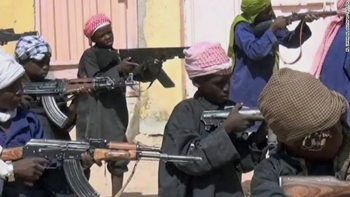Focus on Child Soldiers: Nigeria
By Madison Feser
Staff Writer
Scared, vulnerable, and alone—the children of Nigeria are living in a state of desperation and peril since Boko Haram, which has sworn allegiance to ISIS, tightened its violent grip on West Africa. As the terrorist organization moves through Nigeria, Chad, Cameroon, and Niger, they burn villages, kill civilians, loot homes, and steal children.
The #BringBackOurGirls campaign swept through the international community in response to the kidnapping of 276 schoolgirls from Chibok, but little attention has been paid to the 500 children stolen from Damasak, reports the Washington Post, or the estimated 10,000 boys torn from their families, reports the New York Times. These missing children are a part of what New York Times calls Nigeria’s “stolen generation,” and they are being used as suicide bombers and child soldiers.
Since Boko Haram began its armed campaign eight years ago, 2,000 schools have been closed, and the number of attacks carried out by children has skyrocketed, according to Aljazeera. Between January and October 2017, the number of suicide bombings carried out by children reached 110, reports the New York, which is more than four times higher the number for all of 2016.
Most of the suicide bombers are girls under the age of 15, reports Aljazeera, and, on at least one occasion, included an infant. If girls refuse to marry a Boko Haram fighter, they are forced into suicide belts and vests with orders to detonate their devices in populated areas like market squares, parks, universities, and military barracks. Failure to carry out their orders leads to severe punishment for the girls or the killing of their family members. These attacks by young women have become so frequent that officials have put together public service announcement videos telling girls that, if ordered on a suicide mission for Boko Haram, they can surrender to Nigerian authorities, reports the New York Times.
Although created with good intentions, these video messages perpetuate the idea that these girls, or their families, are supporters of Boko Haram who entered their service willingly, rather than treating them as victims of an extremist militant group. Some of these girls choose to blow themselves up away from other people in order to minimize the death toll, others plead their case to soldiers and police who help them remove the explosives. Despite the video’s promise, however, simply approaching Nigerian authorities is extremely dangerous, the New York Times notes, due to increased stigma and suspicion from an increasingly apprehensive society.
In one three month period of 2016, 13 children, between 11 and 17 years old, were killed by Nigerian authorities after falsely being identified as suicide bombers. Some girls even squat when they approach military checkpoints to demonstrate they have no suicide belts or vests on, hoping to convince nervous soldiers that they pose no threat to the checkpoint.
While girls are forced into marriage and made into suicide bombers, boys captured by Boko Haram are trained into soldiers for the cause. They are taught how to shoot guns, use rocket launchers, drive trucks, launch counter attacks against Nigerian soldiers, and kill on command. If they prove themselves, they are better fed, and if they fail to cooperate, they are killed.
“Over time, this strains the children’s ability to cope and stay true to their civilian identity,” Michael Wessells, a professor at Columbia University, told the New York Times. The children, he says, begin to disassociate and exist in a state between who they were and the reality of their current situation.
These kidnapped boys are forced into a culture of brutality and slaughter, kept drugged so they do not ask too many questions, and then are forced to inflict violence on civilians. After a while, most boys stop thinking about escape either because they have come to believe Boko Haram’s mission, they have no family to which they can return, or they fear Nigeria’s civilian vigilante groups will imprison them for working with terrorists.
If these boys and girls do manage to escape, they are told to keep their stories to themselves, and never to talk about what they saw or what they were forced to do.
“These children walked out of hell,” wrote New York Times journalist, Sarah Topol, “into a world that didn’t seem to want them.”



